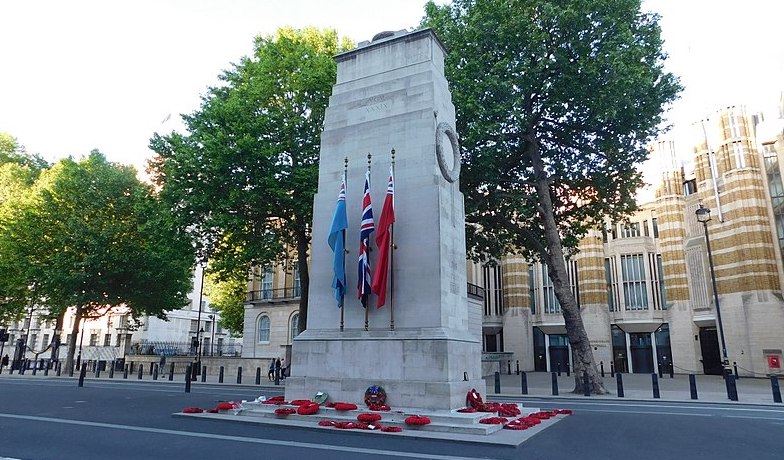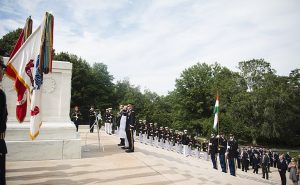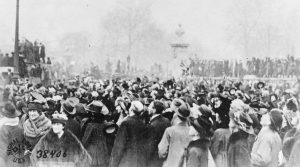
Churchill on Armistice Day: War, Peace and Foreboding
Armistice Day November 11th
My German grandmother, Connecticut-born, was as patriotic an American as George Washington. She always referred to November 11th as Armistice Day, which has always been good enough for me these many years. But numerous soldiers have died since 1918. Accordingly, the holiday was rebranded Remembrance Day in Canada, and then in Britain and the rest of the Commonwealth. In the USA, Armistice Day was renamed Veterans Day in 1954.

The teaching of history is very uneven now. I fear not enough know what Armistice Day was about. Wikipedia records the truce signed at 5:45 am between the Allies of World War I and Germany in the forest of Compiègne. It took effect at 11:00 am—the “eleventh hour of the eleventh day of the eleventh month.” But both sides fought on for the rest of the day, ending only at nightfall. “The Armistice expired after a period of 36 days and had to be extended several times. A formal peace agreement was only reached when the Treaty of Versailles was signed the following year.”
In The World Crisis, his memoir of the Great War, Winston Churchill pondered that eleventh hour. He was then Minister of Munitions—relieved suddenly from the quandary of arming the forces for yet another year of grim battle.
It was one of Churchill’s most ringing passages and, on this day of Remembrance, it seems appropriate. From The World Crisis, Vol. 3, Part 2 (London: Thornton Butterworth, 1927), pages 541-44:
Armistice Day 1918
It was a few minutes before the eleventh hour of the eleventh day of the eleventh month. I stood at the window of my room looking up Northumberland Avenue towards Trafalgar Square, waiting for Big Ben to tell that the War was over. My mind strayed back across the scarring years to the scene and emotions of the night at the Admiralty when I listened for these same chimes in order to give the signal of war against Germany to our Fleets and squadrons across the world. And now all was over!….
The minutes passed. I was conscious of reaction rather than elation. The material purposes on which one’s work had been centred, every process of thought on which one had lived, crumbled into nothing. The whole vast business of supply, the growing outputs, the careful hoards, the secret future plans—but yesterday the whole duty of life—all at a stroke vanished like a nightmare dream, leaving a void behind…
“Triumphant pandemonium”

And then suddenly the first strokes of the chime. I looked again at the broad street beneath me. It was deserted. From the portals of one of the large hotels absorbed by Government Departments darted the slight figure of a girl clerk, distractedly gesticulating while another stroke resounded.
Then from all sides men and women came scurrying into the street. Streams of people poured out of all the buildings. The bells of London began to clash. Northumberland Avenue was now crowded with people in hundreds, nay, thousands, rushing hither and thither in a frantic manner, shouting and screaming with joy….
The street was now a seething mass of humanity. Flags appeared as if by magic. Streams of men and women flowed from the Embankment. They mingled with torrents pouring down the Strand on their way to acclaim the King. Almost before the last stroke of the clock had died away, the strict, war-straitened, regulated streets of London had become a triumphant pandemonium….
It was with feelings which do not lend themselves to words that I heard the cheers of the brave people who had borne so much and given all, who had never wavered, who had never lost faith in their country or its destiny, and who could be indulgent to the faults of their servants when the hour of deliverance had come.
“Is this the end?”
The curtain falls upon the long front in France and Flanders. The soothing hands of time and nature, the swift repair of peaceful industry, have already almost effaced the crater fields and the battle lines which in a broad belt from the Vosges to the sea lately blackened the smiling fields of France….
Only the cemeteries, the monuments and stunted steeples, with here and there a mouldering trench or huge mine-crater lake, assail the traveller with the fact that 25 millions of soldiers fought here and 12 millions shed their blood or perished in the greatest of all human contentions less than ten years ago. Merciful oblivion draws its veils; the crippled limp away; the mourners fall back into the sad twilight of memory. New youth is here to claim its rights, and the perennial stream flows forward even in the battle zone, as if the tale were all a dream.
Is this the end? Is it to be merely a chapter in a cruel and senseless story? Will a new generation in their turn be immolated to square the black accounts of Teuton and Gaul? Will our children bleed and gasp again in devastated lands? Or will there spring from the very fires of conflict that reconciliation of the three giant combatants, which would unite their genius and secure to each in safety and freedom a share in rebuilding the glory of Europe?
Further reading
“Churchill Clairvoyant, 1891: Confidence or Realism?”
“Wikipedia: Churchill’s World War Accounts: History of Memoirs?”







One thought on “Churchill on Armistice Day: War, Peace and Foreboding”
Thank you Richard.A fitting piece on Veterans Day as an important remembrance of what it means which is now being forgotten among a generation of historically illiterate people.
Comments are closed.